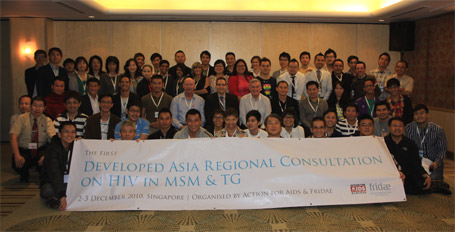The following is a press statement issued by Developed Asia Sexual Diversity Network (DAN) Working Group on Dec 7:
Delegates from Hong Kong and Macau, Japan, Singapore, South Korea and Taiwan voted unanimously last Friday to form a regional network to address similar epidemiological profiles, namely rapidly rising HIV and other STI infection rates amongst MSM and transgender people, among other commonalities.
At the landmark inaugural Developed Asia Regional Consultation on HIV in MSM (men who have sex with men) and transgender people held on Dec 2 and 3, each country or territory nominated two representatives to form a working group tasked to steer the formation of the network, to be called the Developed Asia Sexual Diversity Network (DAN). It expects to collaborate on research, sharing of good practices, and policy advocacy among other aims.
Seventy delegates including health sector and United Nations officials, researchers, and community representatives representing 40 organisations from the region including Malaysia, Thailand and China discussed a broad range of topics including resource mobilisation, living with HIV, and dealing effectively with the emerging trends of drug use through harm reduction strategies. The conference also heard that young MSM and transgenders are at particularly high risk because existing prevention messaging is not reaching them.
During the opening plenary, Geoff Manthey of the UNAIDS Regional Support Team, Asia and the Pacific shared that despite progress made in most countries globally evidenced by falling infection rates for the past 10 years, MSM and transgender infection rates continue rise in many countries in Developed Asia.
The Commission on AIDS in Asia report (2008) found that unless significant investment is made into prevention, treatment, and care and support programs specifically targeting MSM, MSM are projected to contribute 50% of all new infections in the region.
Addressing the audience after the announcement of the formation of the new network, Manthey said: “I believe that this meeting has offered us another step, if not leap forward towards better programming for MSM and TG in countries of DAN. We can share lessons learnt, but we can also share our lesson plans, our lesson evaluation plans, our plans and experience on how to measure impact and success.”
During a closed door meeting of the working group, delegates agreed to work towards formalising the network at the next International Congress on AIDS in Asia and The Pacific to be held in Busan, South Korea in August 2011.
The DAN Working Group comprises:
- Dr Krystal Lee, Centre for Emerging Infectious Diseases (Chinese University), Hong Kong
- Ray Lam, Midnight Blue, Hong Kong
- Kohta Iwahashi, NPO PLACE Tokyo, Japan
- Dr Jane Koerner, Nagoya City University, Japan
- Dr Stuart Koe, Fridae, Singapore
- Donovan Lo, Action for AIDS, Singapore
- Kim Jae Cheon, South Korea
- Lee Jaesung, Solidarity for LGBT Human Rights of Korea, South Korea
- A/Prof Nai-Ying Ko, National Cheng Kung University, Taiwan
- Ashley Wu, Taiwan Tongzhi Hotline Association, Taiwan
- Colin Fan, Tongzhi Men’s Health Forum, China*
- Roger Meng, Tongzhi Men's Health Forum, China*
- Raymond Tai, PT Foundation, Malaysia*
- Dr Zaki Arzmi, Malaysian Aids Council, Malaysia*
* Hong Kong and Macau, Japan, Singapore, South Korea and Taiwan are members of the Developed Asia Sexual Diversity Network (DAN). China, Malaysia and Thailand belong to other sub-regional networks of Asia Pacific Coalition on Male Sexual Health (APCOM) and are non-voting members of DAN.
The working group further nominated Dr Stuart Koe and Kim Jae Cheon as Community Representative and Alternate Representative to the APCOM Governing Board respectively.
The Developed Asia Regional Consultation was organised by Fridae and Action for AIDS Singapore, and was made possible through grants received from APCOM and MAC AIDS Fund of Tides Foundation.

